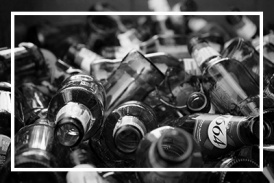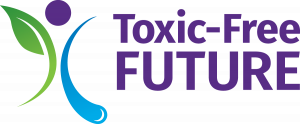Washington finalizes list of toxic products for safer solutions assessment
Part of the nation’s strongest toxic chemical law, the final list includes PVC packaging, PFAS in paints, and toxic chemicals in cosmetics and adhesives
Under the Safer Products for Washington program, priority products were identified as significant sources or uses of high-hazard priority chemicals and chemical classes, including:
-Plastic PVC or PVDC packaging (organobromine or organochlorine substances)
-Cosmetics (cyclic volatile methyl siloxanes)
-Architectural paints (PFAS and alkylphenol ethoxylates)
-Sealants, caulks, and adhesives (ortho-phthalates)
Washington is the only state in the nation with a comprehensive program—Safer Products for Washington—dedicated to identifying and taking regulatory action to phase out harmful chemicals in everyday products. Toxic-Free Future released the following statement in response to this news:
“High-hazard chemicals in consumer products present an ongoing threat to the health of people and the planet—especially children, overburdened communities, and sensitive species like salmon and orcas,” said Cheri Peele, director for government and market policy at Toxic-Free Future. “Toxic-Free Future applauds the Department of Ecology for its continued leadership in identifying harmful chemicals in consumer products that put communities, wildlife, and the environment at risk. The priority products selected by Ecology present an excellent opportunity to protect public health and move companies to safer solutions. Based on existing market trends, we know that these solutions exist.”
Priority products are selected with a goal of reducing exposure to toxic chemicals—particularly among sensitive populations. In evaluating products, Ecology is required to consider the volume of priority chemicals found in the product, the volume of the product sold in Washington, the potential for environmental releases and exposure to sensitive species and populations, the availability and feasibility of safer alternatives, and existing regulations from other jurisdictions.
Next, Ecology will begin evaluating whether safer, feasible, and available alternatives exist for the specified priority chemicals or chemical classes in these priority products. If they do, Ecology may restrict the priority chemicals in the specified priority products.
In addition to naming new priority products in Cycle 2, the Department of Ecology will continue evaluating several product categories first identified in Cycle 1, Cycle 1.5, and in previous review cycles or in statute. These products remain under review to determine whether safer, feasible, and available alternatives exist. Both the newly designated and continuing priority products are listed in the tables and can be found here: https://toxicfreefuture.org/press-room/washington-finalizes-list-of-toxic-products-for-safer-solutions-assessment/
ABOUT SAFER PRODUCTS FOR WASHINGTON
The Safer Products for Washington Act is the nation’s strongest law regulating toxic chemicals in products—a major source of contamination in our homes, food, waterways, and bodies. Passed in 2019, this precedent-setting law helps protect people and the environment from toxic chemical exposure and pollution.
The law directs state agencies to identify products that are significant sources of high-priority chemicals and gives Washington’s Department of Ecology the authority to take action to reduce them. Ecology can ban or require the disclosure of harmful chemicals in a wide range of products—including plastics, personal care products, electronics, and building materials. The law also empowers Ecology to require companies to disclose full ingredient information to support regulatory decisions and product public health.
TOXIC-FREE FUTURE
Toxic-Free Future is a national leader in environmental health research and advocacy. Through the power of science, education, and activism, Toxic-Free Future drives strong laws and corporate responsibility that protects the health of all people and the planet. www.toxicfreefuture.org
Stephanie Stohler
Toxic-Free Future
email us here
Visit us on social media:
LinkedIn
Bluesky
Instagram
Facebook
YouTube
X
Legal Disclaimer:
EIN Presswire provides this news content "as is" without warranty of any kind. We do not accept any responsibility or liability for the accuracy, content, images, videos, licenses, completeness, legality, or reliability of the information contained in this article. If you have any complaints or copyright issues related to this article, kindly contact the author above.
Renowned Keyhole Neurosurgeon Dr. Mohana Rao Patibandla Inspires at TEDx Mumbai with Vision for Accessible Healthcare
Accounts Payable Automation Transforms USA Retail Finance with Faster, Accurate Processing
Civil Engineering Services Help Construction Firms Streamline Compliance and Design
Więcej ważnych informacji
 Jedynka Newserii
Jedynka Newserii

 Jedynka Newserii
Jedynka Newserii

Handel

1 października ruszy w Polsce system kaucyjny. Część sieci handlowych może nie zdążyć z przygotowaniami przed tym terminem
Producenci, sklepy i operatorzy systemu kaucyjnego mają niespełna dwa miesiące na finalizację przygotowań do jego startu. Wówczas na rynku pojawią się napoje w specjalnie oznakowanych opakowaniach, a jednostki handlu powinny być gotowe na ich odbieranie. Część z nich jest już do tego przygotowana, część ostrzega przed ewentualnymi opóźnieniami. Jednym z ważniejszych aspektów przygotowań na te dwa miesiące jest uregulowanie współpracy między operatorami, których będzie siedmiu, co oznacza de facto siedem różnych systemów kaucyjnych.
Ochrona środowiska
KE proponuje nowy cel klimatyczny. Według europosłów wydaje się niemożliwy do realizacji

Komisja Europejska zaproponowała zmianę unijnego prawa o klimacie, wskazując nowy cel klimatyczny na 2040 roku, czyli redukcję emisji gazów cieplarnianych o 90 proc. w porównaniu do 1990 rok. Jesienią odniosą się do tego kraje członkowskie i Parlament Europejski, ale już dziś słychać wiele negatywnych głosów. Zdaniem polskich europarlamentarzystów już dotychczas ustanowione cele nie zostaną osiągnięte, a europejska gospodarka i jej konkurencyjność ucierpi na dążeniu do ich realizacji względem m.in. Stanów Zjednoczonych czy Chin.
Handel
Amerykańskie indeksy mają za sobą kolejny wzrostowy miesiąc. Druga połowa roku na rynkach akcji może być nerwowa

Lipiec zazwyczaj jest pozytywnym miesiącem na rynkach akcji i tegoroczny nie był wyjątkiem. Amerykańskie indeksy zakończyły go na plusie, podobnie jak większość europejskich. Rynki Starego Kontynentu nie przyciągają jednak już kapitału z taką intensywnością jak w pierwszej części roku. Z drugiej strony wyceny za oceanem po kolejnych rekordach są już bardzo wysokie, a wpływ nowego porządku celnego narzuconego przez Donalda Trumpa – na razie trudny do przewidzenia. W najbliższym czasie na rynkach można się spodziewać jeszcze większej zmienności i nerwowości, ale dopóki spółki pokazują dobre wyniki, przesłanek do zmiany trendu na spadkowy nie ma.
Partner serwisu
Szkolenia

Akademia Newserii
Akademia Newserii to projekt, w ramach którego najlepsi polscy dziennikarze biznesowi, giełdowi oraz lifestylowi, a także szkoleniowcy z wieloletnim doświadczeniem dzielą się swoją wiedzą nt. pracy z mediami.



![Nestlé w Polsce podsumowuje wpływ na krajową gospodarkę. Firma wygenerowała 0,6 proc. polskiego PKB [DEPESZA]](https://www.newseria.pl/files/1097841585/fabryka-nesquik_1,w_85,r_png,_small.png)




.gif)

 |
| |
| |
|